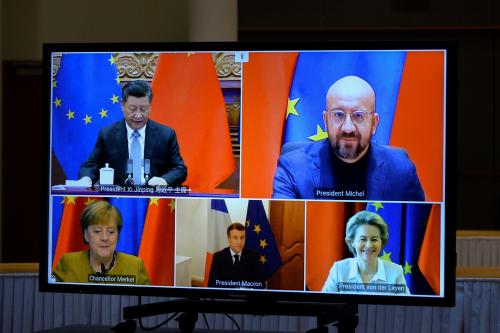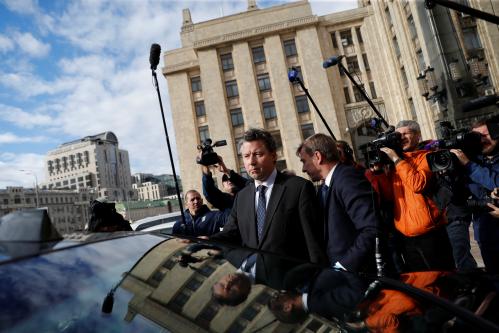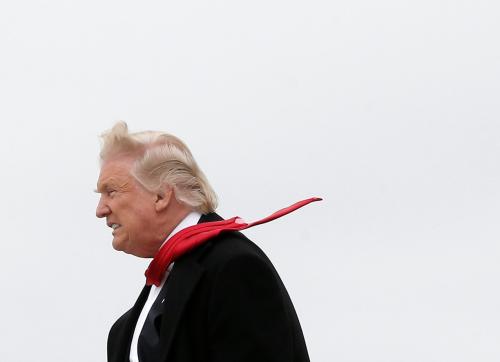The impasse over Nord Stream 2 threatens trans-Atlantic ties; to solve it, the United States and Europe should reach a compromise that both guards against future Russian interference and offers greater support for central and eastern Europe, in particular for Ukraine, writes Constanze Stelzenmüller. This post originally appeared in the Financial Times.
“Democracy” is invoked no less than 47 times in the 24 pages of US president Joe Biden’s Interim National Security Strategic Guidance. In particular, the new administration insists on the need for democratic allies to stand together against authoritarian great powers such as Vladimir Putin’s Russia and Xi Jinping’s China. Based on the past week, however, the US is firmly resolved to go nose-to-nose not just with its challengers, but also with its allies.
Last Wednesday, Biden agreed with the description of Russia’s president as “a killer”. A day later, US secretary of state Antony Blinken and national security adviser Jake Sullivan very publicly clashed with their Chinese counterparts in Anchorage.
On that same day, the secretary of state had issued a terse statement on Nord Stream 2, a pipeline intended to bring Russian natural gas via the Baltic Sea to Germany, circumventing the key transit route through Ukraine and Poland. Blinken called it “a Russian geopolitical project intended to divide Europe and weaken European energy security.” He warned that “any entity involved . . . risks US sanctions and should immediately abandon work on the pipeline.”
The Russians and Chinese promptly gave as good as they got. Putin mockingly challenged Biden to a public debate. China’s foreign minister Wang Yi treated Blinken to a furious harangue. But the Europeans — to be precise, the Germans — were left blinking in the headlights.
While the pipeline is owned by Gazprom and co-financed by five European companies (France’s Engie, Austria’s OMV, the Dutch-British Shell, and the German Uniper and Wintershall), its political ownership resides in Berlin. Most other European governments oppose it; some German policymakers devoutly wish it would go away. Yet German chancellor Angela Merkel’s government had been counting on being able to persuade Washington to accept a pragmatic solution for a construction project that is 95 per cent complete.
But the Biden team is itself in a double bind. It wants to stand up to Russia, but improve US-German relations, which had fallen to a nadir in the Trump era. At home, a bipartisan drum section in Congress has been clamouring for more companies to be put on the sanctions list. A report is due in May.
Texas Republican senator Ted Cruz, a Trump ally and 2024 presidential hopeful, has been gleefully using the statutory deadline to block the government’s senior political nominations. Biden’s choice for CIA director William Burns was confirmed by the Senate immediately after Blinken’s tough statement of last week, but other candidates remain on hold. The message is clear: sanctions, or the nominees get it.
This deadlock must end. Berlin’s mulish inflexibility could alienate the most Europe-friendly American administration it is likely to see in a generation. If Washington remains intransigent, it risks humiliating Germany, a key ally, ahead of a potentially game-changing national election in September. Even more importantly, neither America nor Europe can hope to deter and contain their aggressive challengers alone.
The beneficiaries of a continued impasse, meanwhile, are all those who have reason to oppose a renewed partnership between the transatlantic democracies: political extremists in America and Europe, and their friends and enablers in Russia and China.
Given what is at stake, the incentives for a muscular compromise are compelling. US sanctions legislation permits waivers if “appropriate safeguards have been put in place”. Those safeguards should be specific, quantifiable and immediately applicable.
They should include a moratorium after the pipeline’s completion; a “snapback mechanism” to prevent Russian manipulation of the gas supply; energy security assurances for eastern European countries and for Ukraine; support for Ukraine’s economic and democratic transformation; ensuring the full application of EU energy regulations; and investments in eastern European connectivity and in the transition away from fossil fuels. All these should be addressed in close co-ordination with the EU, central and eastern European capitals and Kyiv.
When Biden recently called for a new transatlantic engagement at an online security conference, Merkel answered that Germany stood ready. The alliance’s foreign ministers are meeting in Brussels this week for in-person consultations. Resolving the Nord Stream 2 problem should be at the top of their list.
The Brookings Institution is committed to quality, independence, and impact.
We are supported by a diverse array of funders. In line with our values and policies, each Brookings publication represents the sole views of its author(s).








Commentary
Nord Stream 2 impasse threatens trans-Atlantic ties
March 23, 2021